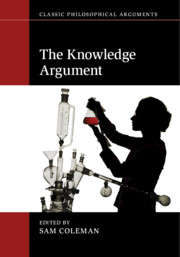Book contents
- The Knowledge Argument
- Classic Philosophical Arguments
- The Knowledge Argument
- Copyright page
- Contents
- Contributors
- Introduction: The Enduring Significance of Jackson’s Knowledge Argument
- 1 The Knowledge Argument Is an Argument about Knowledge
- 2 There’s Nothing about Mary
- 3 Acquaintance, Parsimony, and Epiphenomenalism
- 4 Acquaintance and Phenomenal Concepts
- 5 The Knowledge Argument Meets Representationalism about Colour Experience
- 6 The Mary-Go-Round
- 7 Concept Mastery, Social Externalism, and Mary’s New Knowledge
- 8 Mary’s Powers of Imagination
- 9 The Knowledge Argument Is Either Indefensible or Redundant
- 10 Grounding, Analysis, and Russellian Monism
- 11 Phenomenal Knowledge Why: The Explanatory Knowledge Argument against Physicalism
- 12 The Knowledge Argument and the Self
- 13 What Uninformed Mary Can Teach Us
- Bibliography
- Index
9 - The Knowledge Argument Is Either Indefensible or Redundant
Published online by Cambridge University Press: 09 September 2019
- The Knowledge Argument
- Classic Philosophical Arguments
- The Knowledge Argument
- Copyright page
- Contents
- Contributors
- Introduction: The Enduring Significance of Jackson’s Knowledge Argument
- 1 The Knowledge Argument Is an Argument about Knowledge
- 2 There’s Nothing about Mary
- 3 Acquaintance, Parsimony, and Epiphenomenalism
- 4 Acquaintance and Phenomenal Concepts
- 5 The Knowledge Argument Meets Representationalism about Colour Experience
- 6 The Mary-Go-Round
- 7 Concept Mastery, Social Externalism, and Mary’s New Knowledge
- 8 Mary’s Powers of Imagination
- 9 The Knowledge Argument Is Either Indefensible or Redundant
- 10 Grounding, Analysis, and Russellian Monism
- 11 Phenomenal Knowledge Why: The Explanatory Knowledge Argument against Physicalism
- 12 The Knowledge Argument and the Self
- 13 What Uninformed Mary Can Teach Us
- Bibliography
- Index
Summary
Jackson’s (1982) formulation of the knowledge argument (KA) has had an inestimable influence on the discussion of consciousness and the apparent problem it presents for physicalism. A common objection to KA is the ‘ignorance objection’. According to this objection, our intuitions about Mary merely reflect our ignorance of physical facts that are integral to the explanation of phenomenal consciousness (e.g. Dennett 1991; Stoljar 2006). Armed with the insights of a future science, Mary would actually be able to deduce what it’s like to see red. We only have the intuition that Mary would learn something new because we don’t know the things she knows. Those sympathetic to KA have brushed away the ignorance objection on the grounds that even though we don’t know what the future science of consciousness will reveal, we do know what kind of facts it will contain and know that this is the wrong kind of fact from which to deduce facts about phenomenal consciousness. In other words, they suggest that the insight that underwrites KA is ‘future-proof’: it is not the kind of insight that could be displaced by new scientific knowledge. I argue that this strategy for defending KA is dialectically problematic and reveals a fundamental limitation of the argument.
- Type
- Chapter
- Information
- The Knowledge Argument , pp. 180 - 197Publisher: Cambridge University PressPrint publication year: 2019
- 1
- Cited by

